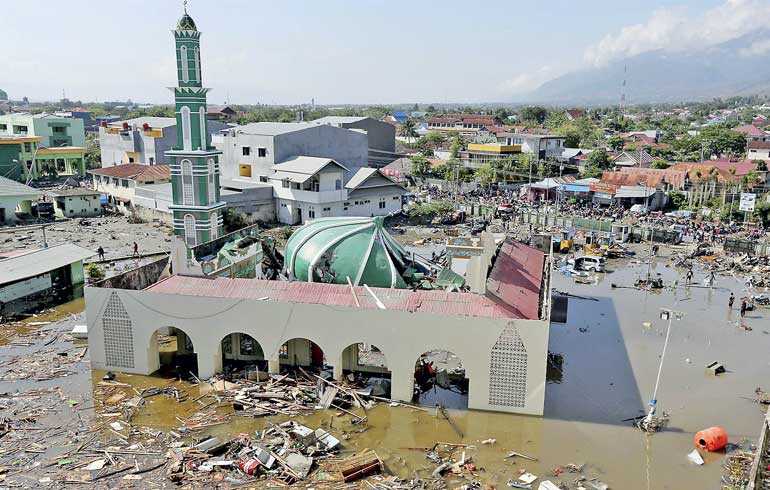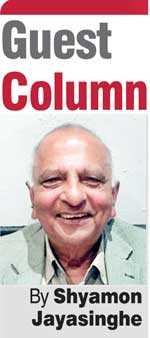Friday Feb 20, 2026
Friday Feb 20, 2026
Thursday, 11 October 2018 00:00 - - {{hitsCtrl.values.hits}}

I am at a loss to make sense of the terrible catastrophe in Indonesia. At the time of writing, I watched on Al Jazeera how a pathetic, large-scale human tragedy was unfolding in the Indonesian province of Sulawesi.
A 7.5 magnitude colossal earthquake followed by a tsunami left over 100,000 people – babes, kids, elderly and the sick included – starving, waiting until international agencies bring food. They have lost their homes. Over 1,500 persons have been found dead and buried under the rubble. Hundreds of thousands are still to be found. The province of Palu is also seriously affected.
The question: “Why”?
Why did all this happen to the largest Muslim state in the world where people pray five times a day? Nobody can deny the justice of my question and I have no interest in belittling any faith. I ask as a rational and thinking man who is confronted with a puzzling situation. We need an answer as we are set with a challenge and we need to know where to go from here.
If we were dumped in a foreign land and have lost our direction, we enquire from those who know. I think the Indonesian crisis leaves thinking people thrown into serious confusion with regard to their existential living. One cannot let the ball pass to the wicket keeper and continue with our assumptions for the simple reason that our very assumptions with respect to our existence and how we got here have come under siege.
Provoked and the unprovoked
History has recorded, from time immemorial, both natural disasters killing hordes of innocent people and man-made evils doing the same job. Mankind has come face to face with the same challenge over and over again.
To quote a story from the man-imposed tragic event called the holocaust, I like to turn to the novel, ‘The Tattooist of Auschwitz,’ written by Heather Morris. Auschwitz, we know, was one of Hilter’s prison camps located in Poland where truck-loads of Jews were brought in and dumped for suffocation by gas. These prisoners, man, woman and child – whole families – were uprooted from their homes and forcefully brought to Auschwitz where they had to first work their bones out while on a starvation diet, constructing their own death bed or crematorium. When in a terribly weak condition, these hapless persons were marched to the crematorium and suffocated to death. Their only crime was being Jewish.
In this novel the main character, Lale Sokolov, is asked by Geeta another (woman) prisoner with whom Lale develops a love relationship:
“Do you still believe in God?”
“Not anymore. Not after this….no.”
In this example, Lale is a thinker who reflected about the event. He did not let the ball pass. The event provoked and consumed him. Many natural and man-induced mass-scale tragedies should provoke us to re-think our assumptions but they don’t do that; most of us, victims included, let the ball pass.
Worse still, many affected find a way out to rationalise and justify their beliefs.
Archbishop of Canterbury
I remember the massive tsunami in 2004 when even Sri Lanka was attacked. The Archbishop of Canterbury, when questioned in the way I now question, responded saying he is severely ‘embarrassed’. The Archbishop was being frank. He was a thinker. Perhaps the Archbishop reflected: “Where is God? Why is he indifferent? Or, more simply, does he exist at all?” Or even, in a mood of anguish and self-guilt, “Am I conning around with my parish?”
Getting around or rationalising the event
Those who don’t bother to question can be left alone as hapless persons who are silenced by sheer incompetence; they are walking dead. On the other hand, the hard nuts are those who present theoretical explanations to justify the happening and keep the God assumption afloat.
In the Indonesian event, it is reported how a woman raised her hands and praised God for having saved her. Did it not occur to her to ask why God allowed the suffering of so many millions? Or why she was put into the trouble in the first place?
In a similar vein, one can recall how many times a ‘cancer survivor’ has praised God for having saved him. Most of these have been cases of temporary disappearance of symptoms. They are called remissions. But that does not bother such persons. They go down on their knees and make thanksgivings. Why did it not occur to these lucky ones that the majority of patients will not even have remissions but will suffer and die? How could that be a thankful event?
Besides, why does it not occur to such persons to ask why God had let him get the dreadful disease and suffer, in the first place?
Among the many other rationalisers are those who attempt to get a bit more sophisticated. They say “God moves in mysterious ways… it is not our right to question these events.” They might point out that God has a “plan” for each of us and we must submit to his divine will. There are over eight billion people in the world living in every nook and corner of the planet. Could one even imagine how a God can pick and implement and monitor his plan in respect of each of these eight billion persons? Doesn’t make sense isn’t it? But no, to the believer it does make sense.
Some would even say that God is testing us? That cannot be accepted because it is a cruel test and God, by definition, is good.
All these objectors have one thing in common: their brains are wired to believe and have faith under any circumstances. In the event of contradicting evidence, such persons reject the evidence and stick to the belief. I need not refer to those who cling to their positions for material gain.
Karma theory
The Indian Karmic theory, although followed by many religionists who name themselves as atheists (Buddhists included) also seems to be predicated on an assumption of an Orderer, Designer or Commander whose task is to ration and allocate desserts to those who live undesirable lives. How else can a negative deed lead the dying individual to a specific appropriate fate in the next life?
I remember how my mother got womb cancer in her very young days. My father, who was given to astrological thinking, went to an Indian soothsayer who constructed a rigmarole about my mother having been in her previous birth a princess born to a royal family in China and how she had kicked a pregnant woman. “This cancer in the womb is a result of that evil karma,” the conner said.
Now, this is a con story obviously but I bring this here to hypothesise a scenario of a person being reborn to a pattern of life determined by her previous doings in a previous birth. Such a development implies an Orderer or Commander who will note and micro-manage the nasty behaviour of persons in order to re-order their next life. The acts themselves could not have the potential to do that complicated design job.
If one doesn’t subject given beliefs like the above to critical scrutiny, the latter would look very reasonable. The woman who kicked a pregnant woman deserves to get cancer in the womb! Very logical.
Call for critical scrutiny
It is the job of educationists to inculcate a critical sense among students who would make up the world of their time. In Australia, critical thinking projects are embedded in all subjects at schools. In some other Western countries, critical thinking is taught separately in a dedicated way. No country can afford a population that wouldn’t question the claims of others-whoever the latter maybe.
Religion cannot be granted a protected status when it comes to free enquiry. Religion makes propositions with regard to reality. Today, that is the job of science. Scientific propositions can be validated at least temporarily until new contradicting evidence comes up. Scientists’ findings live and survive upon evidence.
On the other hand, religionists argue that religious explanations of reality are true for all time and can never be questioned even in the face of contradicting evidence. Copernicus questioned when his telescope showed a different reality. The poor bloke got into trouble and, to save his life, he was forced to recant all that he said: “No…no… what I said was poppycock.”
The biggest earthquake that visited religious beliefs was presented by Charles Darwin, when he found evidence from fossils of plant and animals, which countered the assumption that man was created by God. But Charles Darwin was more diplomatic and would defer the release of his findings for a “better” day.
It is a pity that Sri Lanka has lost its way in promoting critical thinking. The concern is nowhere in our syllabi and is not taught separately either. Despite nearly 60 decades of free education, we have an uncritical population most of whom gulp down every fake and slanted claims and accusations of politicians. The generality of our people are easily caught up by emotional slogans relating to ethnicity or religion; they cannot develop a sense of where the country needs to go and how we can get there. Our media is dominated by the ill-products of our deficient education system. Many of the media formidables are not products of universities. The blind lead the blind.
Look at our media: Television channels, for instance, are flooded by astrologers and soothsayers and men and women of the black arts. We had an admirable, though isolated, program in Rupavahini called ‘Yathaarthaya,’ which had the objective of making the public think critically. I was distressed to hear that that program has been cancelled, probably due to pressures of astrologers.
(The writer can be reached via [email protected])